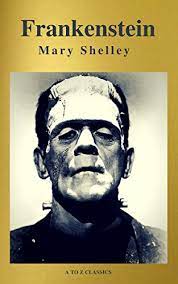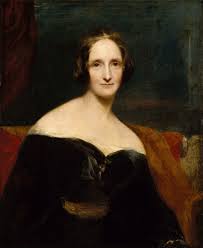Frankenstein Page #16
Frankenstein; or, The Modern Prometheus is an 1818 novel written by English author Mary Shelley. Frankenstein tells the story of Victor Frankenstein, a young scientist who creates a sapient creature in an unorthodox scientific experiment
M. Krempe was not equally docile; and in my condition at that time, of almost insupportable sensitiveness, his harsh blunt encomiums gave me even more pain than the benevolent approbation of M. Waldman. “D—n the fellow!” cried he; “why, M. Clerval, I assure you he has outstript us all. Ay, stare if you please; but it is nevertheless true. A youngster who, but a few years ago, believed in Cornelius Agrippa as firmly as in the gospel, has now set himself at the head of the university; and if he is not soon pulled down, we shall all be out of countenance.—Ay, ay,” continued he, observing my face expressive of suffering, “M. Frankenstein is modest; an excellent quality in a young man. Young men should be diffident of themselves, you know, M. Clerval: I was myself when young; but that wears out in a very short time.” M. Krempe had now commenced an eulogy on himself, which happily turned the conversation from a subject that was so annoying to me. Clerval had never sympathised in my tastes for natural science; and his literary pursuits differed wholly from those which had occupied me. He came to the university with the design of making himself complete master of the oriental languages, and thus he should open a field for the plan of life he had marked out for himself. Resolved to pursue no inglorious career, he turned his eyes toward the East, as affording scope for his spirit of enterprise. The Persian, Arabic, and Sanskrit languages engaged his attention, and I was easily induced to enter on the same studies. Idleness had ever been irksome to me, and now that I wished to fly from reflection, and hated my former studies, I felt great relief in being the fellow-pupil with my friend, and found not only instruction but consolation in the works of the orientalists. I did not, like him, attempt a critical knowledge of their dialects, for I did not contemplate making any other use of them than temporary amusement. I read merely to understand their meaning, and they well repaid my labours. Their melancholy is soothing, and their joy elevating, to a degree I never experienced in studying the authors of any other country. When you read their writings, life appears to consist in a warm sun and a garden of roses,—in the smiles and frowns of a fair enemy, and the fire that consumes your own heart. How different from the manly and heroical poetry of Greece and Rome! Summer passed away in these occupations, and my return to Geneva was fixed for the latter end of autumn; but being delayed by several accidents, winter and snow arrived, the roads were deemed impassable, and my journey was retarded until the ensuing spring. I felt this delay very bitterly; for I longed to see my native town and my beloved friends. My return had only been delayed so long, from an unwillingness to leave Clerval in a strange place, before he had become acquainted with any of its inhabitants. The winter, however, was spent cheerfully; and although the spring was uncommonly late, when it came its beauty compensated for its dilatoriness. The month of May had already commenced, and I expected the letter daily which was to fix the date of my departure, when Henry proposed a pedestrian tour in the environs of Ingolstadt, that I might bid a personal farewell to the country I had so long inhabited. I acceded with pleasure to this proposition: I was fond of exercise, and Clerval had always been my favourite companion in the ramble of this nature that I had taken among the scenes of my native country. We passed a fortnight in these perambulations: my health and spirits had long been restored, and they gained additional strength from the salubrious air I breathed, the natural incidents of our progress, and the conversation of my friend. Study had before secluded me from the intercourse of my fellow-creatures, and rendered me unsocial; but Clerval called forth the better feelings of my heart; he again taught me to love the aspect of nature, and the cheerful faces of children. Excellent friend! how sincerely you did love me, and endeavour to elevate my mind until it was on a level with your own. A selfish pursuit had cramped and narrowed me, until your gentleness and affection warmed and opened my senses; I became the same happy creature who, a few years ago, loved and beloved by all, had no sorrow or care. When happy, inanimate nature had the power of bestowing on me the most delightful sensations. A serene sky and verdant fields filled me with ecstasy. The present season was indeed divine; the flowers of spring bloomed in the hedges, while those of summer were already in bud. I was undisturbed by thoughts which during the preceding year had pressed upon me, notwithstanding my endeavours to throw them off, with an invincible burden. Henry rejoiced in my gaiety, and sincerely sympathised in my feelings: he exerted himself to amuse me, while he expressed the sensations that filled his soul. The resources of his mind on this occasion were truly astonishing: his conversation was full of imagination; and very often, in imitation of the Persian and Arabic writers, he invented tales of wonderful fancy and passion. At other times he repeated my favourite poems, or drew me out into arguments, which he supported with great ingenuity. We returned to our college on a Sunday afternoon: the peasants were dancing, and every one we met appeared gay and happy. My own spirits were high, and I bounded along with feelings of unbridled joy and hilarity.
Translation
Translate and read this book in other languages:
Select another language:
- - Select -
- 简体中文 (Chinese - Simplified)
- 繁體中文 (Chinese - Traditional)
- Español (Spanish)
- Esperanto (Esperanto)
- 日本語 (Japanese)
- Português (Portuguese)
- Deutsch (German)
- العربية (Arabic)
- Français (French)
- Русский (Russian)
- ಕನ್ನಡ (Kannada)
- 한국어 (Korean)
- עברית (Hebrew)
- Gaeilge (Irish)
- Українська (Ukrainian)
- اردو (Urdu)
- Magyar (Hungarian)
- मानक हिन्दी (Hindi)
- Indonesia (Indonesian)
- Italiano (Italian)
- தமிழ் (Tamil)
- Türkçe (Turkish)
- తెలుగు (Telugu)
- ภาษาไทย (Thai)
- Tiếng Việt (Vietnamese)
- Čeština (Czech)
- Polski (Polish)
- Bahasa Indonesia (Indonesian)
- Românește (Romanian)
- Nederlands (Dutch)
- Ελληνικά (Greek)
- Latinum (Latin)
- Svenska (Swedish)
- Dansk (Danish)
- Suomi (Finnish)
- فارسی (Persian)
- ייִדיש (Yiddish)
- հայերեն (Armenian)
- Norsk (Norwegian)
- English (English)
Citation
Use the citation below to add this book to your bibliography:
Style:MLAChicagoAPA
"Frankenstein Books." Literature.com. STANDS4 LLC, 2025. Web. 22 Jan. 2025. <https://www.literature.com/book/frankenstein_1446>.




Discuss this Frankenstein book with the community:
Report Comment
We're doing our best to make sure our content is useful, accurate and safe.
If by any chance you spot an inappropriate comment while navigating through our website please use this form to let us know, and we'll take care of it shortly.
Attachment
You need to be logged in to favorite.
Log In